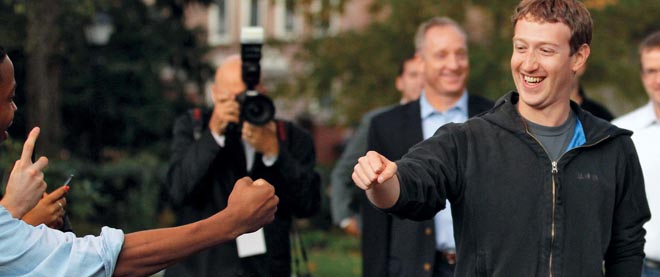Newsmakers 2012: Is Mark Zuckerberg a visionary or a villain?
As Chris Sorensen reports, it depends on who you ask
Steven Senne/AP Photo/The Canadian Press
Share
Mark Zuckerberg
Mark Zuckerberg, the creator and CEO of Facebook, has never been an easy guy to like. The 28-year-old social-media magnate comes across as distant and unfeeling and is prone to awkward pauses. He’s no friend of privacy advocates, who fret about the vast sea of personal information that more than a billion Facebook users have uploaded, and is criticized by users themselves for changing the rules about how data is shared. Zuckerberg was even accused of stealing the Facebook concept itself, as anyone who watched the 2010 film The Social Network knows.
So it comes as little surprise that Zuckerberg would irritate investors, too. Facebook’s initial public offering this spring was not only billed as the biggest tech IPO since Google’s in 2004, but stood as a testament to how much social media has changed (some might say invaded) our lives. It was also viewed as a test of Wall Street’s ability to create and spread around massive amounts of wealth. Some even argued that, by convincing ordinary investors to put money back into the stock market, Facebook and its hoodie-clad creator could revive the ailing U.S. economy.
Click here for the interactive cover of the Newsmakers 2012 issue.
The result, given the hype, wasn’t pretty. On May 18, Facebook’s stock began trading at the IPO’s offer price of $38. A few minutes later it climbed above $40 as the masses rushed in, and then promptly sank like a stone—with an anchor tied to it. The shares eventually bottomed out at around $17.55 about three months later, wiping out more than $50 billion in value. And it wasn’t long before angry investors were looking for someone to blame.
Once again, Zuckerberg found himself in the hot seat. Facebook raised $16 billion in the offering while Zuckerberg personally pocketed $1.1 billion. In his first public appearance after the debacle, Zuckerberg appeared desperate to talk about something else. “The performance of the stock has obviously been disappointing,” said Zuckerberg, board-stiff and unblinking. He then launched into a geeky discussion about efforts to sell more ads on mobile phones and tablets.
But was it really Zuckerberg’s fault? “People treated it like a second coming,” says Carmi Levy, an independent tech analyst based in London, Ont. “And everyone was only too happy to get swept up in the euphoria because, like in the dot-com era, it just felt good.” As for Zuckerberg, Levy called him a “reluctant suitor of Wall Street,” who waited as long as he could to take Facebook public—possibly because he viewed the idea of heading a publicly traded company, with its quarterly analyst calls and disclosure requirements, as a bit of a bummer. “He would rather roll up the sleeves of his hoodie and code with the other programmers,” Levy says. “If he’s guilty of anything, it’s something beyond his control: his age.”
Zuckerberg’s colleagues similarly describe him as misunderstood. They say what comes across as aloofness is really just Zuckerberg being his socially awkward self (although his public-speaking skills have improved considerably over the years). As for his personal life, by all accounts Zuckerberg leads a remarkably modest existence. He might now be worth $12 billion, but he wears the same grey T-shirt nearly every day (he claims to have about 20 of them), drives an entry-level luxury sedan and only recently bought a house in Palo Alto, Calif., after years of renting bachelor pads. He and longtime girlfriend Priscilla Chan, a doctor, were married in the backyard of their new home the day after the IPO, with about 80 close friends and family in attendance. He’s not exactly a money-crazed megalomaniac.
Making peace with Facebook investors will take time, but there’s little reason to bet against Zuckerberg here. Through hard work and vision, he transformed a website he created in his Harvard dorm room into Silicon Valley’s hottest property. Along the way, he fundamentally changed the way people interact with one another.
Zuckerberg may not do everything by the book, but few visionaries do. And if Facebook stock ever climbs to triple digits, as Google’s did, people will call him a tech prodigy and a brilliant businessman too.
